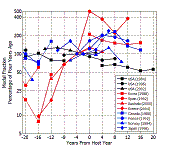A little more than three months ago I posted an analysis of the benefits of hosting the Olympic games. I don't mean the hypothetical economic benefits of hosting; my analysis considered Olympic performance, and whether hosting an Olympic games (summer or winter) has a positive impact on a nation's performance in subsequent Olympic games.
My hypothesis was that hosting, by generating revenue for the NOC, and by spurring government investment in sport facilities, would have a positive impact on performance as measured by medal fraction (medals won, as a percentage of the total number of available medals). To go even further, I proposed that the benefits from hosting either a summer or a winter Olympics would cross over to both. That is, we could speculate that Canada's summer Olympic team (for example) will receive a performance boost from the 2010 winter Olympics, to be held in Vancouver.
Unfortunately my study, which included all summer and winter Olympic games since 1948, did not support my hypothesis. Although the host nation receives a large performance benefit in the hosted Olympics, there does not appear to be a significant long-term effect.
An anonymous commenter suggested that I might be able to rescue my hypothesis if I considered the post-1984 era as distinct from the pre-1984 era. In the comments I proposed to investigate in the "next couple of weeks," which was apparently a bit optimistic. But, better late than never!
Figure 1
Figure 1 — The effect of Olympic hosting on summer Olympic performance, 1984-2004 (click to enlarge).
Figure 1 (inset) shows the post-1984 group of host countries. The figure is basically the same format I used last time, except this time I've shown a line for each individual country. Each curve is displaced in time, so that year zero is the hosting year, and also normalized so that medal performance is on a more or less equal footing. In particular I attempted to make the scores about equal to 100% at -4 years, although I had to do some magic with some of them because I couldn't include 1980 and 1984 in the analysis.
Another change compared to last time is that I have shown both summer hosts and winter hosts on the same plot. To be clear, the vertical axis is always summer Olympic performance; I am attempting to see if there is a noticeable impact of winter hosting on summer performance.
I've divided the group of 11 hosts (from the 1984 summer Olympics through the 2004 summer Olympics) into three groups:
- The black curves show the USA, which has been host three times (1984, 1996, and 2002). In general, the USA behaves like a non-host country (see previous analysis); there is no discernable performance improvement when they are the host nation, even in the host year. I would hypothesize that the Americans are already so dominant, have so many resources, and have hosted so often that very little benefit remains to be gained.
- The red curves represent the (non-US) summer Olympic hosts, Korea, Spain, Australia, and Greece. Based on this small number of examples, there is indeed a noticeable improvement in summer Olympic performance in the years leading up to a hosted summer games, and that improvement is maintained in the 16 years following.
- The blue curves represent the (non-US) winter Olympic hosts, Canada, France, Norway, and Japan. As you might expect, there is no significant "host year" effect that boosts performance in year zero. (Presumably the host effect is due to some kind of "home field advantage.") However, based again on a small number of examples, it appears that the winter hosts do show a small boost in summer performance compared to non-host nations. That is, the blue curves for years 0 and later are mostly above the 100% line, whereas you will recall that non-host nations show a steady decline in their score with time.
It is also interesting to note that the winter host that shows the smallest post-host benefit is Norway, a nation that is already a power in the winter Olympics. Similarly the non-US summer host with the smallest improvement is Australia, a summer Olympic overachiever. These observations (together with the USA results) suggest that Olympic hosting is of greatest benefit to countries that are not already strong performers.
Of course this is all based on a very small sample, so we shouldn't draw too much from it, but let's go ahead and do it anyway. If Canada is anything like the past four winter Olympic hosts, we might see summer Olympic medal fraction increase by something like 50% in the 2012 games, which is pretty exciting (to me). On the other hand, this is Canada's second kick at the can since 1984, which might put us more in the USA group. I suppose that time will tell.



No comments:
Post a Comment